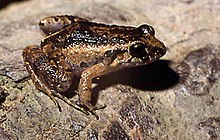Adenomera andreae
| Adenomera andreae | |
|---|---|

| |
| Scientific classification | |
| Domain: | Eukaryota |
| Kingdom: | Animalia |
| Phylum: | Chordata |
| Class: | Amphibia |
| Order: | Anura |
| Family: | Leptodactylidae |
| Genus: | Adenomera |
| Species: | A. andreae
|
| Binomial name | |
| Adenomera andreae (Müller, 1923)
| |
| Synonyms | |
|
Leptodactylus andreae Müller, 1923 | |
Adenomera andreae (common name: lowland tropical bullfrog) is a species of frogs in the family Leptodactylidae.
It is found in the lowlands of northern South America east of the Andes (Bolivia, Brazil, Colombia, Ecuador, French Guiana, Guyana, Peru, Suriname, and Venezuela).[1][2] As currently defined, it probably represents a cryptic species complex,[1] comprising perhaps four species.[3]
Description
Adenomera andreae are small frogs, usually less than 30 mm (1.2 in) in adult body length. Dorsum is grayish brown to beige, occasionally with dark brown spots, and rarely with a vertebral dark brown stripe and/or dorsolateral orangish yellow stripe. The ventral surfaces are white. Iris is chestnut.[4]
Eggs are laid in foam nests on the ground.[1] Tadpoles are terrestrial: they are endotrophic and develop in the nest. Recruitment of juveniles is synchronized with rainfall.[5]
Its predators include large tarantulas.[6]
Habitat
Its natural habitats are tropical moist lowland forests, but it can also be found in open environments such as grasslands surrounded by forest habitats. It is threatened by habitat loss from clear cutting.[1]
References
- ^ a b c d e La Marca, E.; Azevedo-Ramos, C.; Coloma, L.A.; Ron, S. (2004). "Adenomera andreae". IUCN Red List of Threatened Species. 2004: e.T56304A11453385. doi:10.2305/IUCN.UK.2004.RLTS.T56304A11453385.en.
- ^ Frost, Darrel R. (2014). "Adenomera andreae (Müller, 1923)". Amphibian Species of the World: an Online Reference. Version 6.0. American Museum of Natural History. Retrieved 1 August 2014.
- ^ Frost, Darrel R. (2014). "Adenomera Steindachner, 1867". Amphibian Species of the World: an Online Reference. Version 6.0. American Museum of Natural History. Retrieved 1 August 2014.
- ^ Cole, C. J.; Townsend, C. R.; Reynolds, R. P.; MacCulloch, R. D.; Lathrop, A. (2013). "Amphibians and reptiles of Guyana, South America: Illustrated keys, annotated species accounts, and a biogeographic synopsis". Proceedings of the Biological Society of Washington. 125 (4): 317–578. doi:10.2988/0006-324X-125.4.317.
- ^ Glória Moreira; Albertina P. Lima (1991). "Seasonal patterns of juvenile recruitment and reproduction in four species of leaf litter frogs in central Amazonia". Herpetologica. 47 (3): 295–300. JSTOR 3892620.
{{cite journal}}: Unknown parameter|last-author-amp=ignored (|name-list-style=suggested) (help) - ^ Naish, Darren. "Tiny Frogs and Giant Spiders: Best of Friends". Scientific American Blog Network. Retrieved 2020-05-02.

